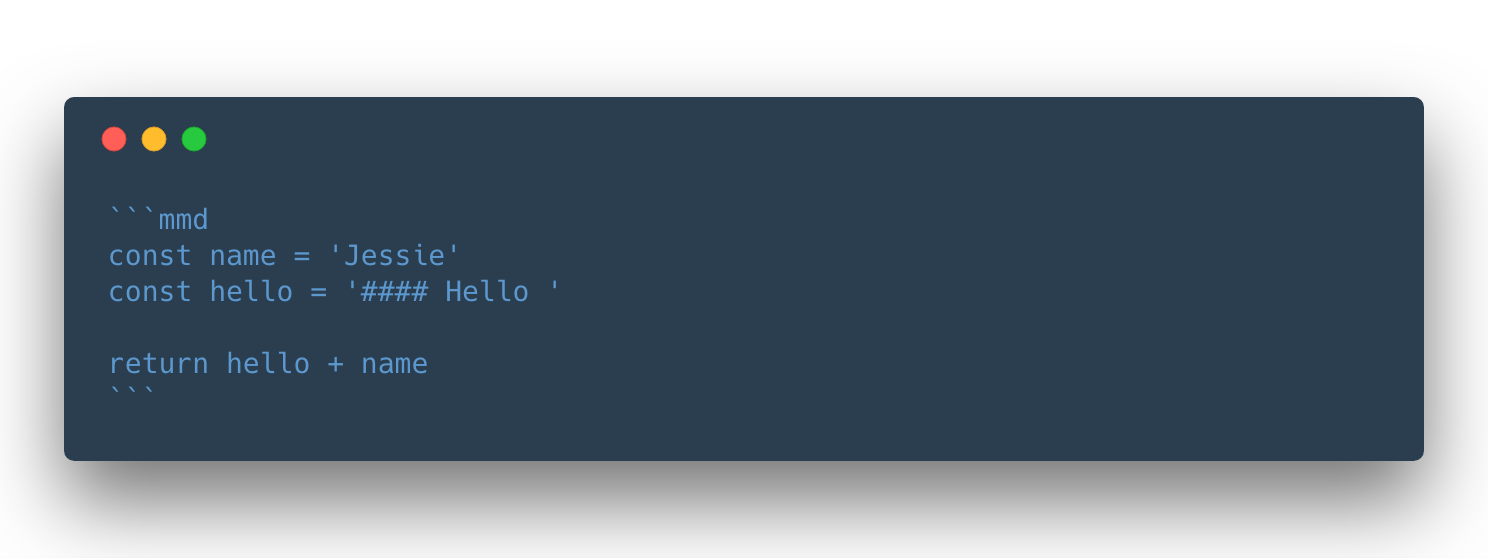https://github.com/albinotonnina/mmarkdown
Interpret mmd fenced code blocks in a markdown file and generate a cooler version of it.
https://github.com/albinotonnina/mmarkdown
generator javascript markdown
Last synced: 6 months ago
JSON representation
Interpret mmd fenced code blocks in a markdown file and generate a cooler version of it.
- Host: GitHub
- URL: https://github.com/albinotonnina/mmarkdown
- Owner: albinotonnina
- Created: 2018-04-21T14:18:37.000Z (over 7 years ago)
- Default Branch: master
- Last Pushed: 2021-03-30T21:19:23.000Z (over 4 years ago)
- Last Synced: 2025-05-22T09:28:11.103Z (7 months ago)
- Topics: generator, javascript, markdown
- Language: JavaScript
- Homepage:
- Size: 35.2 KB
- Stars: 77
- Watchers: 3
- Forks: 3
- Open Issues: 1
-
Metadata Files:
- Readme: Readme.md
Awesome Lists containing this project
- awesome-markdown - mmarkdown :octocat: - Interpret mmd fenced code blocks in a markdown file and generate a cooler version of it. (Convert to Markdown Tools / Source Code to Markdown)
- awesome-markdown - mmarkdown - Interpret mmd fenced code blocks in a markdown file and generate a cooler version of it. (Libraries / JavaScript)
README

# mmarkdown
[](https://app.codacy.com/app/albinotonnina/mmarkdown?utm_source=github.com&utm_medium=referral&utm_content=albinotonnina/mmarkdown&utm_campaign=badger)
> Markdown on caffeine ☕️
Interpret `mmd` fenced code blocks in a markdown file and generate a cooler version of it.
### `mmd` fenced code block

### output:
#### Hello Jessie
## Table of Contents
* [Demo](#demo--boilerplate--real-world-case)
* [Install](#install)
* [Usage](#usage)
* [Maintainers](#maintainers)
* [Contribute](#contribute)
* [License](#license)
## Demo / Boilerplate / Real world case
The file you are reading right now is generated from [this file](./ReadmeSrc/Readme.md).
For a kind of boilerplate repo instead, have a look at [this repo](https://github.com/albinotonnina/mmarkdown-demo).
🌎[MicheleBertoli/css-in-js](https://github.com/MicheleBertoli/css-in-js)
🌎[streamich/cross-ci](https://github.com/streamich/cross-ci)
## Install
```
yarn add mmarkdown --dev
```
### Config package.json (defaults)
```
{
"mmarkdown": {
"src": "./Readme/Readme.md",
"out": "./Readme.md",
"scripts": "./Readme/Readme.js",
"backup": "true",
"backupPath": "./Readme/backup/"
}
}
```
```
{
"scripts":{
"make-readme": "mmarkdown"
}
}
```
### Command line arguments
| argument | description | default |
| ---------- | ------------------------------ | --------------------- |
| src | Source md file | ./ReadmeSrc/Readme.md |
| out | Output md file | ./Readme.md |
| scripts | Helper JS file | ./ReadmeSrc/Readme.js |
| backup | Do a backup of the output file | false |
| backupPath | backup path | ./ReadmeSrc/backup/ |
| help | Show help | |
| version | Show version number | |
```
{
"scripts":{
"make-readme": "mmarkdown --backup --backupPath ./backupReadme/"
}
}
```
## Usage
Mmarkdown takes a plain markdown file and generates a copy of it.
It starts to be less boring when you add [fenced code blocks](https://help.github.com/articles/creating-and-highlighting-code-blocks/) with the language identifier set to `mmd`.
Everything that is returned (as a string) from the code in a block will be interpreted and replaced to the block in the output file.
It's full async, which is cool, _lots of `awaits` are waiting for you_ there but soon enough you will face a problem: too much code to write in a markdown file! Terrible experience!
The solution in mmarkdown is in the `scripts` option. The module that the scripts file returns will be passed to the context of the fenced block, see [example 3](#example3).
The `backup` option, false by default, will make a copy of the current output file, postfix it with a timestamp and move it into `backupPath`.
### Example 1
#### `mmd` fenced code block:
```javascript
const hello = message => {
return message
}
return hello('### hippieeeeee hippie yeeeee!!!!!!!!')
```
#### output:
### hippieeeeee hippie yeeeee!!!!!!!!
### Example 2
#### `mmd` fenced code block:
```javascript
const array = [1, 3, 5]
return array.map(item => '#### ' + item).join('\n\n')
```
#### output:
#### 1
#### 3
#### 5
### Example 3, with Scripts
[this script file ](./ReadmeSrc/Readme.js) is passed to mmarkdown with the `scripts` option:
```javascript
module.exports = {
processMyArray: async array =>
new Promise(resolve => {
setTimeout(() => {
resolve(
array.map(item => ({
name: item + ' async'
}))
)
}, 1000)
})
}
```
#### mmd fenced code block:
```javascript
//scripts is passed
const array = [1, 3, 5]
const something = await scripts.processMyArray(array)
const myFinalString = something.map(item => '#### ' + item.name)
.join('\n\n')
return myFinalString
```
#### output:
#### 1 async
#### 3 async
#### 5 async
(The setTimeout is there just for demo purposes)
## Maintainers
[@albinotonnina](https://github.com/albinotonnina)
## Contribute
PRs accepted.
## License
MIT © 2018 Albino Tonnina